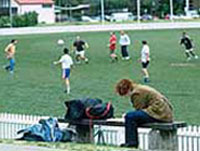Resolving Civil Disputes - LAWS2371
Faculty: Faculty of Law
School: Faculty of Law
Course Outline: See below
Campus: Sydney
Career: Undergraduate
Units of Credit: 6
EFTSL: 0.12500 (more info)
Indicative Contact Hours per Week: 4
Enrolment Requirements:
Pre-requisite: LAWS1075 or JURD7175 (Contracts); Pre-requisite: LAWS1072 or JURD7172
Equivalent: LAWS2311
Excluded: JURD7211, JURD7271, LAWS2311
CSS Contribution Charge: 3 (more info)
Tuition Fee: See Tuition Fee Schedule
Further Information: See Class Timetable
View course information for previous years.
Description
Course Learning Outcomes
- Demonstrate awareness of principles of resolving civil disputes and their relationship to the broader context;
- Apply cumulative knowledge and skills to propose solutions to hypothetical fact scenarios;
- Apply cumulative knowledge and skills to engage in critical analysis of the policy issues underlying case determinations and choice of dispute resolution options;
- Recognise and explain appropriate responses to ethical constraints and dilemmas associated with the resolution of civil disputes;
- Show a practical, client-centred approach to creative problem solving by advising on options for dispute resolution and evaluating possible client choices;
- Demonstrate effective written communication skills by articulating legal concepts clearly, persuasively and appropriately for diverse audiences; and
- Demonstrate effective oral communication skills by discussing and debating course concepts in a scholarly, reflective and respectful manner.
Topics
- Jurisdiction
- Case management
- Initiating proceedings and pleadings
- Causes of action and parties
- Service
- Discovery
- Preparing evidence
- Enforcement
- Appeal
- Costs
- Negotiation
- Mediation
- Arbitration
Assessment
Class participation - 10%
Advice to client (group work) - 20%
Drafting Exercise (group work) or in-class test - 20%
Texts
- Dorne Boniface, Miiko Kumar and Michael Legg, Principles of Civil Procedure in New South Wales (2011 2d ed).
- Michael Legg (ed), The Future of Dispute Resolution (2012 forthcoming).









